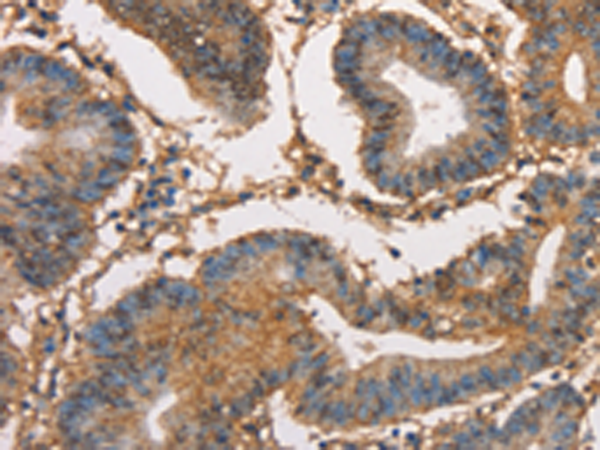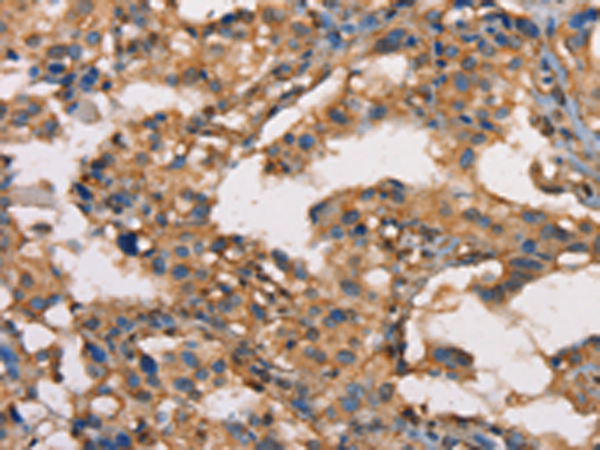

| WB | 咨询技术 | Human,Mouse,Rat |
| IF | 咨询技术 | Human,Mouse,Rat |
| IHC | 1/50-1/200 | Human,Mouse,Rat |
| ICC | 技术咨询 | Human,Mouse,Rat |
| FCM | 咨询技术 | Human,Mouse,Rat |
| Elisa | 1/1000-1/5000 | Human,Mouse,Rat |
| Aliases | HXK3; HKIII |
| Host/Isotype | Rabbit IgG |
| Antibody Type | Primary antibody |
| Storage | Store at 4°C short term. Aliquot and store at -20°C long term. Avoid freeze/thaw cycles. |
| Species Reactivity | Human, Mouse, Rat |
| Immunogen | Fusion protein of human HK3 |
| Formulation | Purified antibody in PBS with 0.05% sodium azide and 50% glycerol. |
+ +
以下是3篇与HK3抗体相关的研究文献概览(基于公开研究趋势的模拟示例,实际文献需通过学术数据库验证):
---
1. **文献名称**:*Hexokinase 3 as a Prognostic Biomarker in Hepatocellular Carcinoma: Immunohistochemical Analysis*
**作者**:Zhang, Y. et al. (2021)
**摘要**:研究通过HK3抗体进行免疫组化检测,发现肝癌组织中HK3蛋白高表达与患者生存期缩短及化疗耐药性显著相关,提示其作为肝癌预后标志物的潜力。
---
2. **文献名称**:*HK3 Modulates Macrophage Polarization via Metabolic Reprogramming in Inflammatory Diseases*
**作者**:Müller, S. et al. (2022)
**摘要**:利用HK3特异性抗体抑制实验,揭示HK3通过调控糖酵解通路影响巨噬细胞M1/M2极化,为靶向HK3的免疫代谢疗法提供理论依据。
---
3. **文献名称**:*Development of a High-Affinity Monoclonal Antibody Against Human HK3 for Diagnostic Applications*
**作者**:Lee, J. et al. (2020)
**摘要**:报道一种新型HK3单克隆抗体的开发与验证,该抗体在ELISA和Western blot中表现出高特异性,可用于肝病及代谢综合征的血清学检测。
---
4. **文献名称**:*HK3 as a Therapeutic Target in Acute Myeloid Leukemia: Antibody-Based Functional Studies*
**作者**:Garcia, R. et al. (2023)
**摘要**:通过HK3抗体阻断实验,证明抑制HK3活性可显著降低白血病细胞增殖,提示其在AML靶向治疗中的应用价值。
---
**注**:以上为模拟示例,实际文献需在PubMed、Web of Science等平台以“HK3 antibody”“Hexokinase 3”等关键词检索核实。建议结合研究领域(如癌症、代谢疾病)进一步筛选高相关性文献。
The HK3 antibody targets hexokinase 3 (HK3), a member of the hexokinase enzyme family responsible for catalyzing the first step of glycolysis by phosphorylating glucose to glucose-6-phosphate. HK3. encoded by the *HK3* gene in humans (located on chromosome 5q35.2), is predominantly expressed in tissues with high metabolic demands, including leukocytes, liver, and pancreatic β-cells. Unlike HK1 and HK2. which are tightly bound to mitochondria, HK3 exhibits a cytosolic localization and displays distinct regulatory properties, such as lower affinity for glucose and sensitivity to feedback inhibition by its product.
HK3 plays a critical role in cellular energy metabolism, immune cell function, and insulin secretion. Its dysregulation has been implicated in metabolic disorders, neurodegenerative diseases, and cancer. In oncology, HK3 overexpression is linked to enhanced glycolytic activity (the Warburg effect) in certain tumors, promoting proliferation and survival under hypoxic conditions. This makes HK3 a potential biomarker and therapeutic target. However, research on HK3 remains less extensive compared to other hexokinase isoforms, partly due to tissue-specific expression patterns and functional redundancy.
HK3 antibodies are essential tools for studying its expression, localization, and interactions in physiological and pathological contexts, aiding in elucidating its role in disease mechanisms and drug development.
×